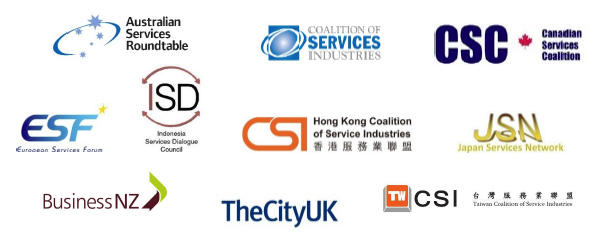
Global Services Coalition (GSC) Statement
at the 11th Annual Global Services Summit
Washington, D.C. (November 7, 2019) - The Global Services Coalition (GSC) speaks for the services sector in its members' respective countries on matters of international trade and investment and represents their industries internationally. Services enable and support every economic sector from manufacturing to agriculture and, through digital technology, services are propelling their competitiveness, growth, and job creation.
Services have eclipsed the growth of goods and now account for half of global trade on a value-added basis. Much of the current and future growth of services trade is tied to the growth of digital trade and the rise in digitally enabled services. In order to unleash the benefits of services and digital trade, a range of pressing issues must be addressed.
There must be multilateral digital rules of the road and a strong, revitalized WTO to enforce them. To achieve that end, the GSC urges WTO members to intensify negotiations to create a high standard e-commerce agreement. This should include, among other elements: facilitation of cross border data flows and fostering e-commerce enabling services, prohibition of forced data localization in all service sectors, a permanent moratorium on e-commerce customs duties, prohibition of disclosure or transfer of source code or algorithms, trade facilitation provisions, promotion of risk-based cybersecurity measures; and negotiation of services market access commitments to enable growth in e-commerce.
This list, while not exhaustive, highlights some of the key elements that GSC members consider must be included in an e-commerce agreement. These rules must also allow for data-security and appropriate and effective protection of personal data; they must be assured through compliance with local privacy and security regulations. Any exceptions to principles promoting cross-border data flow and prohibiting forced localization should be limited to legitimate public policy objectives in full compliance with the provisions of GATS Articles XIV and XIV bis, and accord equal treatment to local and foreign services providers.
It is also imperative that WTO members ensure continuation of the WTO E-Commerce Moratorium banning custom duties on electronic transmissions. The moratorium has long been a critical part of the global foundation of the digital economy and is a shining example of how the multilateral system can promote policies that foster innovation and growth, particularly for small and medium size enterprises. GSC members attach immediate high priority to ensuring that the moratorium does not lapse at the end of 2019 and at a minimum is continued until the 2020 WTO Ministerial with a view to reaching agreement at ministerial level on a permanent extension. Any lapse in the Moratorium will severely damage business confidence and risk a downturn in global trade and investment in services, at a time the global economy can ill afford such an outcome.
The multilateral trading system must be strengthened and re-energized to ensure that it continues to provide a solid foundation for the system to operate and in particular for the negotiation of 21st century rules and commitments on digital trade and services. The worldwide acceptance of the rule of law and the disciplines of the multilateral trading system has created a framework for countries to take commitments with respect to their trading partners in exchange for mutually agreed access to each other's markets. This has provided a transparent and stable foundation for commercial transactions around the globe and can be the key to unleashing opportunities for developed and developing economies alike to thrive, lifting millions out of poverty, creating jobs, and fostering innovation and growth.
The GSC urges WTO members to meet the challenge of securing the future of the multilateral rules-based system, to intensify efforts to reach agreement on a high standard e-commerce framework agreement and to ensure the continuation of the E-Commerce Moratorium.

